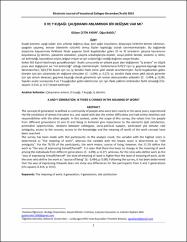X ve Y Kuşağı: Çalışmanın Anlamında Bir Değişme Var Mı?

View/
Access
info:eu-repo/semantics/openAccesshttp://creativecommons.org/licenses/by-nc-nd/3.0/us/Date
2014Metadata
Show full item recordCitation
ÇETİN AYDIN Gülşen, BAŞOL Oğuz (2014) "X ve Y Kuşağı: Çalışmanın Anlamında Bir Değişme Var Mı?", EJOVOC, Cilt: 4, Sayı: 4, ss. 1-15.Abstract
Kuşak kavramı, aşağı yukarı aynı yıllarda doğmuş olup, aynı çağın koşullarını, dolayısıyla birbirine benzer sıkıntıları, yazgıları yaşamış, benzer ödevlerle yükümlü olmuş kişiler topluluğu olarak tanımlanmaktadır. Bu bağlamda araştırma kapsamında Kırklareli ilinde yaşayan farklı kuşaklardan gelen (X ve Y) bireylerin çalışma kavramının boyutlarına (iş tatmini, yükselme olanakları, çalışma arkadaşlarıyla ilişkiler, sosyo-politik destek, katılımcı iş iklimi, rol belirsizliği, kaynaklara erişim, bilgiye erişim ve işin anlamlılığı) verdiği değerler araştırılmıştır. Anket 363 kişinin katılımıyla gerçekleşmiştir. Analiz sonucunda en yüksek puan alan değişkenin “iş anlamı” en düşük puan alan değişkenin ise “rol belirsizliği” olduğu belirlenmiştir. Katılımcıların %78,5’i için iş: geçinme kaynağı olarak tanımlanırken; %21,5’lik kesim için ise iş: kendini ifade etme şekli olarak tanımlanmıştır. Farklı kuşaklardan gelen bireyler için işin anlamında bir değişme olmazken (Z: -1,096; p: 0,27); işi, kendini ifade etme şekli olarak görenler için işin anlam derecesi, geçinme kaynağı olarak görenlerin işin anlam derecesinden yüksektir (Z: -3,494; p: 0,00). Yapılan analiz sonrasında X ve Y kuşağından gelen katılımcılar için işin ifade şeklinin birbirinden farklı olmadığı (Chisquare: 0.315; p: 0,57) tespit edilmiştir. The concept of generation is defined as community of people who were born nearly in the same years, experienced the life conditions of almost the same era, and coped with also the similar difficulties and had similar destinies and responsibilities with the other people. In this context, under the scope of this survey, the values that the people from different generations (X and Y) and living in Kırklareli give importance to the elements (job satisfaction, promotion opportunities, relations between colleagues, socio-political support, participant job climate, role ambiguity, access to the sources, access to the knowledge and the meaning of work) of the work concept have been searched. The survey has been made with 363 participants. In the analysis result, the variable with the highest score is determined as “the meaning of work”, whereas the variable with the lowest score is determined as “role ambiguity”. For the 78.5% of the participants, the work means; source of living, however, the 21.5% define the work as “the way of expressing himself/herself”. It is seen that there has been no change in the meaning of work among the individuals from different generations (Z: -1,096; p: 0.27); whereas, for the ones who define work as the “way of expressing himself/herself” the level of meaning of work is higher than the level of meaning of work, as for the ones who define the work as “source of living” (Z: -3,494; p: 0.00). Following the survey, it has been determined that the way of expressing thework does not show any differences for the participants from X and Y generations (Chi-square: 0.315; p: 0.57).
Source
Electronic Journal of Vocational CollegesCollections
- Makale Koleksiyonu [335]
- Makale Koleksiyonu [76]
- Makale Koleksiyonu [443]
The following license files are associated with this item:



















